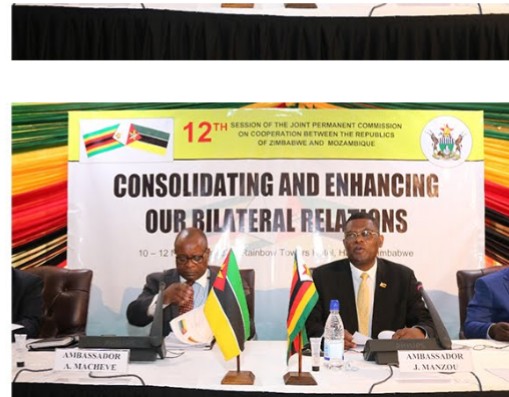|
Getting your Trinity Audio player ready…
|
By Joyce Mukucha
The sister countries, Zimbabwe and Zambia are working towards strengthening their relationship in different areas including improving the way of doing doing business and finalising the pending areas aimed at benefitting the two nations.
This came out this Wednesday during a convened 12th Session of Zimbabwe and Mozambique Joint Permanent Commission on Cooperation (JPCC) meeting which had been inactive for about eight years.
The JPC is a signed agreement between two countries for periodic high-level conferences on matters of mutual interest.
In his opening remarks on the occasion, the Permanent Secretary for Foreign Affairs and International Trade, ambassador James Manzou highlighted that the meeting was being held immediately following that of members in the Defence and Security sectors who met in Maputo from 13 to 15 October 2021.
“I am reliably informed that theirs was a resounding success, and that achievement must therefore give greater impetus for our meeting to go a notch higher.
“We are meeting here in Harare exactly eight (8) years following our last meeting in Maputo in November 2013. You will agree with me that such a long time lag is not desirable to the promotion of cooperation between neighbours and friends.
“It is against this background that our Agenda is populated with issues that have not been concluded or finalised for far too long. In this regard, my humble appeal to colleagues is for all of us to work tirelessly to ensure that we cover sufficient ground to present a good report and recommendations to the Ministers on Friday,” he said.
On the brighter side, the permanent secretary said he was delighted to note that cooperation between Zimbabwe and Zambia has continued during the intersessional period.
“I am informed that six Memoranda of Understanding/Agreements were signed during this period. One of them is the Memorandum of Understanding in Agriculture which was signed in July 2019. I, therefore, urge our two Ministries of Agriculture to move with a sense of urgency to develop the Joint Implementation Plan. When fully implemented, this instrument will help our two countries improve the food security situation and directly impact the lives of our people”
In the Transport and Energy Sectors, he said, engagements were made too during this period in efforts to address the many challenges faced by both countries.
“It is common knowledge that Mozambique provides the shortest route to the sea for Zimbabwe’s imports and exports. This makes the development of both road and rail infrastructure on the Beira and Limpopo Development Corridors a top priority not only for our two countries, but for the SADC region too.
“The two corridors are vital arteries of the African Union’s North-South Transport Corridor. Mozambique’s cooperation in this area has turned Zimbabwe from being landlocked into a land-linked country. It is against this background that the conclusion of the MoUs on cooperation in the two Corridors becomes urgent. The two instruments have been on the negotiating table for an inordinate amount of time.”
He emphasised that the work on the transport infrastructure cannot be complete without the establishment of the One Stop Border Posts at Forbes-Machipanda and Nyamapanda-Cuchamano as agreed at the last Session of the Joint Commission.
“The One Stop Border Posts will address the bottlenecks to the smooth movement of people and goods that our people have been complaining about for far too long. I, therefore, urge the Ministries charged with this responsibility to redouble their efforts in implementing this decision,” Manzou said.
Concerning the serious energy deficits the SADC region continue to experience, he stressed the need for Zimbabwe and Mozambique to work collectively in ensuring that industrialization take place in the region.
“To overcome this challenge, our countries need to work together both at the bilateral and regional levels. It is also a known fact that without sufficient power we have no hope of achieving our goal of industrialization in the region. It is in that regard that I compliment the efforts that our relevant Ministries and power utilities have been making to address the challenges.”
The permanent secretary also highlighted the bulk of Zimbabwe’s petroleum products are imported through Mozambique’s port of Beira and transported to Mutare through pipeline thus the need to build a second pipeline from Beira to Mutare and on to Harare.
“Looking into the future fuel requirements of the country and region, Zimbabwe has proposed to build a second pipeline from Beira to Mutare and on to Harare. This is one of the new agenda items Zimbabwe proposed for the Joint Commission. It is my hope that negotiations on this issue will be conducted with the urgency it deserves and concluded.”
Reflecting on the performance in the social-cultural sector, Manzou said,” There are a number of issues that are still pending including the MoU on Youth Affairs; MoU concerning Cooperation in Science, Technology, Higher Education and Professional Training; MoU on ICTs; and the list goes on and on. Let us be candid enough with ourselves and deeply introspect to see if all these instruments are still relevant eight years later.
“Should we feel that they are important bilateral instruments, let us pursue them to finality. If we believe that the issues on the Agenda have been overtaken by events, we should also be brave enough to rise to the occasion and label them such, so that we can forge ahead to implement programmes and projects that bring benefits to our peoples.”
Mozambique’s Director for Africa and the Middle East in the Ministry of Foreign Affairs and Cooperation Ambassador Antonio Macheve said the two countries have historic relations highlighting that today Zimbabwe is in the front in helping in the fight against terrorism in Cabo Delgado.
“This must mark the turning point considering it is the last before the binational, we need to move with speed in all areas for the benefit of our two countries,” said Ambassador Macheve.
